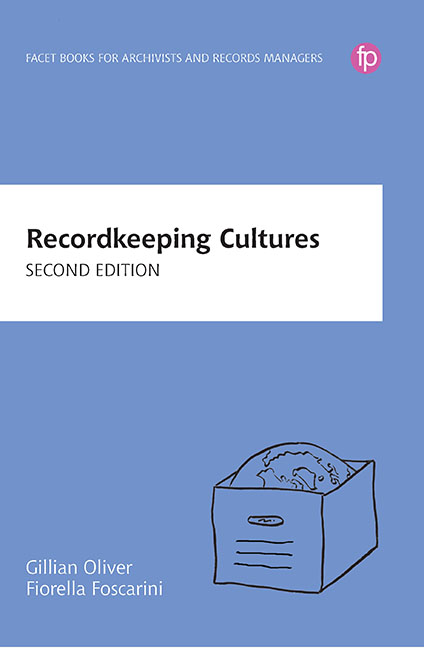5 - Information-Related Competencies
Published online by Cambridge University Press: 28 October 2020
Summary
This chapter is the first of two that consider the knowledge, skills and expertise that individual employees required in order to carry out their records management responsibilities – the factors are identified at level two of the ICF (see Figure 2.1). Two main components of this information expertise can be distinguished: information-related competencies and awareness of environmental requirements (a.k.a. legislative/regulatory awareness). The latter is the subject of the next chapter.
Information and digital literacy skills are essential prerequisites for the development of a diffuse recordkeeping culture in organisations. The purview of this area is very wide ranging, from general skills such as the ability to deal with information overload, to the particular training needs associated with specific systems. In keeping with the increasing blurring of the boundaries between work and social life, digital literacy skills in particular will encompass competencies in a broad range of activities.
The chapter begins with discussion of the need to provide training for employees, and the issues and challenges faced in doing so. This is followed by an explanation of the two main perspectives that can be used in relation to recordkeeping training, information and digital literacy. Suggestions for using issues and concerns in these broad areas to focus on recordkeeping responsibilities include dealing with information overload, use of social media and digital continuity. Assessment techniques at level two of the ICF should preferably be undertaken in collaboration with others within the organisation, but suggestions for a solely recordkeeping approach are included here. The section on interventions suggests ways in which training content can be presented, including using employees’ need for skills to manage their personal digital lives as a means of communicating key recordkeeping concepts.
The ‘how to’ of training is discussed in Chapter 6.
The training imperative
There is no question about the need for records managers to be actively involved in providing training to other members of their organisations. The international standard on records management, ISO15489, unequivocally emphasises that the practitioners charged with managing records programmes are not the only ones with duties and responsibilities relating to the creation and maintenance of records. The standard states that:
[recordkeeping] responsibilities should be designated to all personnel who create and use records as part of their work, and be reflected in job descriptions and similar statements, where appropriate.
(ISO15489-1, 6.3)- Type
- Chapter
- Information
- Recordkeeping Cultures , pp. 79 - 94Publisher: FacetPrint publication year: 2019



